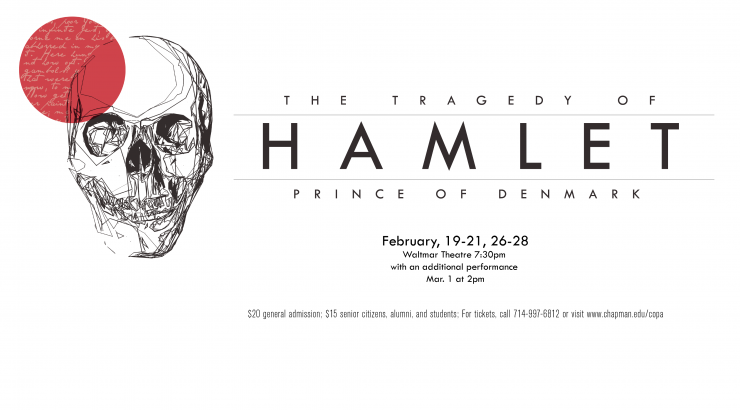
Shakespeare expert directs CU theatre students in “Hamlet”
February 11, 2015
Once in a while, college theatre students have an opportunity to perform in a heavyweight Shakespearean classic. But rarely do they have the chance to be directed by a regional icon of the genre and in a performance of what’s arguably regarded as a touchstone for English literature.
For the past four weeks, Chapman University’s
Professor Thomas F. Bradac
has worked with his student cast of 15 in preparation for their February 19 opening of
The Tragedy of Hamlet, Prince of Denmark
by William Shakespeare in Chapman’s Waltmar Theatre. The entire production is also supported by 24 student crew members who produce everything from costumes, to set construction and lighting. By the time of their first curtain call, the group will have rehearsed for a scant six weeks – a relatively short span of time for a work of such deep meaning and significance.
Hamlet
is the story of a young prince who struggles to cope with the sudden death of his father and his mother’s equally sudden and suspect remarriage. The characters explore a rich diversity of emotion and universal themes of humanity, making this work one of William Shakespeare’s masterpiece tragedies.
When presented in its entirety, the performance typically runs four hours in length, excluding any intermissions. Professor Bradac, like many directors, has modified this production for the sake of modern audiences, in part due to verses in the script that require the perspective and contemporary knowledge of an Elizabethan audience to fully understand.
“Few productions of this play go uncut,” explains Bradac. “There are three original versions – we are following the First Folio edition and have reduced it to 2.5 hours. The overall integrity of the story and the use of blank verse, however, remain fully intact.”
Professor Bradac’s theatre career spans more than four decades, most of which has been spent focused on works by the Bard, William Shakespeare. He is the founding artistic director of Shakespeare Orange County, having served the organization from 1992 to 2013, where he directed and produced more than 50 plays. He also founded the Grove Shakespeare Festival (1979-1991), guiding it through 13 seasons in which he produced and/or directed 110 plays. He is also a founding director of the Shakespeare Theatre Association, an international service organization for theatres dedicated to producing Shakespeare, and served as the organization’s President. Bradac has performed, directed, produced, and taught Shakespeare throughout southern California as well as Canada and the Czech Republic; and he has won the prestigious Hollywood Drama Logue Publisher’s Award for Exceptional Achievement in Theatre for his work with Grove Shakespeare Festival, The Helena Modjeska Award for Service to Orange County, CA by OC Weekly and the Kennedy Center/American College Excellence in Education Award for his teaching.
“Hamlet is considered one of the greatest works in the English language because of the depth of understanding of the human condition it portrays,” says Bradac. “There are some aspects of the play that present a challenge to our students simply due to their limited life experience; however, this cast has worked very hard to grasp as much of the subtlety as possible – and they’re doing a terrific job. After all, Hamlet is a college student of sorts, so on that level our actors can relate to him because of his age. When you really get down to it, this story is about a family with problems. And students can identify with it on that level.”
To help the actors prepare, the Theatre department offers two classes in Shakespeare acting that focus on interpreting the text and punctuation that is unique to Shakespeare’s writings, and many of those in the production have taken one or both of the courses. “They learn how to deal with blank verse and make it available to their audience,” says Bradac. “And we spend a great deal of time in rehearsals, helping them to understand what is being said and to whom. One of the reasons this play has endured for over 400 years is that you see something different in it each time. It’s all about the interpretation — where does it come from in the actors….each person brings their own experience.”
Tickets are available now for the popular drama, which runs February 19-21, 26-28 at 7:30 p.m., and March 1 at 2 p.m. Prices are $20 general admission, $15 senior citizens, alumni and non-Chapman students. Visit
chapman.edu/tickets
or call (714) 997-6812.



